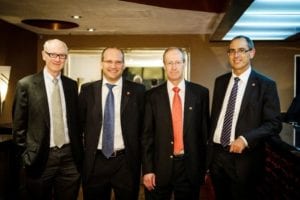Pictured: John Grill, WorleyParsons chairman; Digby Glover, WorleyParsons TWP COO; Nigel Townshend, WorleyParsons executive director Sub-Saharan Africa, Global Mining and Precious Metals; and Andrew Wood, WorleyParsons chief executive officer
A major new initiative in the global and African engineering, procurement and construction management (EPCM) market was given lift-off recently with the official launch of the expanded WorleyParsons resources and energy organisation, on the back of its acquisition of TWP Holdings in South Africa. A recent launch ceremony in Johannesburg, attended by top WorleyParsons and TWP executives and customers, follows the recent R900 million acquisition of the TWP group by WorleyParsons, giving rise to one of the largest EPCM companies in Africa. The transaction is one of the top 10 acquisition activities in South Africa for the year to date. WorleyParsons, which is headquartered in Australia and listed on the Australian Stock Exchange, is the world’s fourth-largest EPCM company, servicing the global resources and energy industries. The organisation works across three key customer sector groups – hydrocarbons; power, infrastructure and environment; and minerals, metals and chemicals and has enjoyed a presence in the sub-Saharan region since 2004.“South Africa has always been the natural hub from which to expand the group’s presence and capabilities in sub-Saharan Africa. Our new South African business now sits alongside other locations in the WorleyParsons group such as London, Abu Dhabi, Calgary, Houston and Perth as one of our major global hubs,” explains WorleyParson’s chairman, John Grill.
Andrew Wood, CEO of the WorleyParsons group, says the acquisition has three key benefits. “It strategically positions us as one of the strongest services platforms in sub-Saharan Africa. We believe in the future development of Africa as one of the major resource regions of the world. The combination of TWP’s and WorleyParsons’ existing capabilities provides a compelling offering to customers developing projects in Africa and we anticipate the expansion of local activity within South Africa and into the broader region.”






